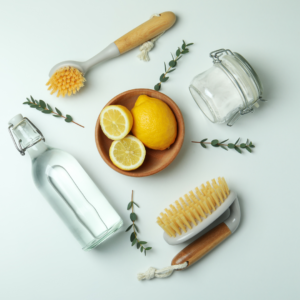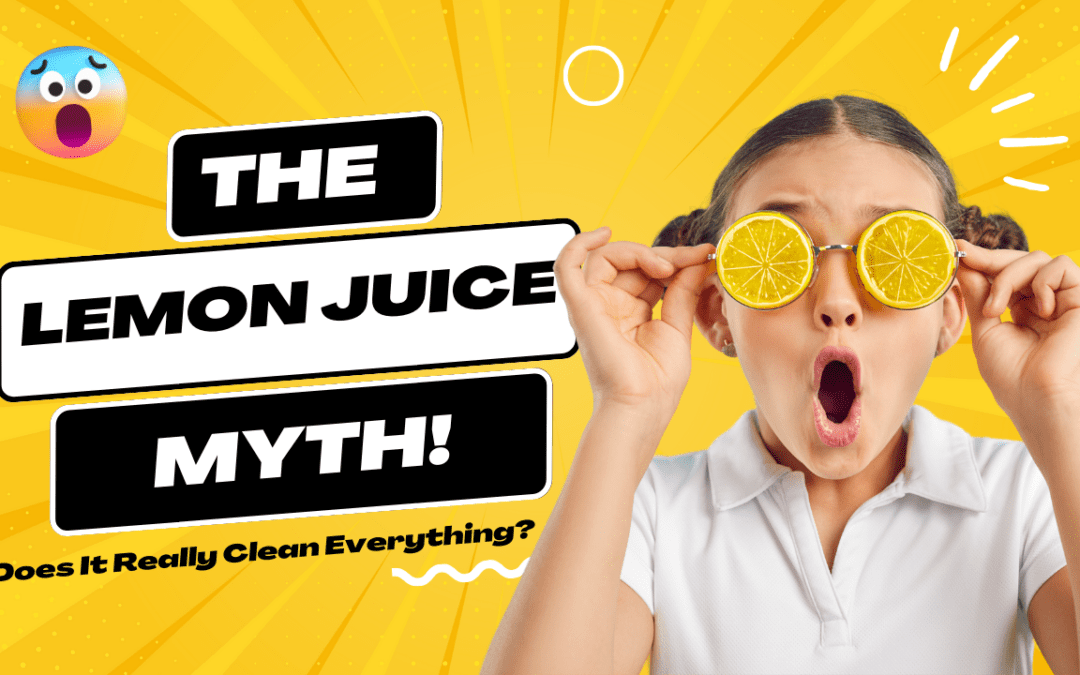Lemon juice, with its zesty aroma and vibrant acidity, has earned a reputation as a natural cleaning powerhouse. You’ve probably heard that it can clean everything from kitchen countertops to bathroom fixtures, but is this citrus wonder truly a one-size-fits-all cleaning solution, or is it just another cleaning myth? In this blog, we’ll dive into the world of lemon juice as a cleaning agent, debunking some misconceptions and exploring its actual effectiveness.
The Chemistry Behind Lemon Juice
Lemon juice’s cleaning prowess stems from its natural properties. It contains citric acid, which gives it its characteristic tartness and low pH level. This acidity makes lemon juice effective at breaking down certain types of stains and grime. Additionally, its pleasant scent can leave your home smelling fresh.

What Lemon Juice Can Clean
Lemon juice can indeed be used to clean a variety of surfaces and household items. Here are some areas where it can be effective:
- Countertops: Lemon juice can help remove stains on countertops, especially those caused by fruit juices or red wine. Its acidity can dissolve mineral deposits and leave surfaces looking shiny.
- Cutting Boards: The natural antibacterial properties of lemon juice make it a suitable choice for disinfecting cutting boards.
- Microwave: Mixing lemon juice with water and heating it in the microwave can help loosen food splatters and make them easier to wipe away.
- Stainless Steel Appliances: Lemon juice can help remove water spots and stains from stainless steel surfaces, leaving them streak-free.
- Glass and Mirrors: A mixture of lemon juice and water can serve as a streak-free glass and mirror cleaner.
The Lemon Juice Limitations
While lemon juice can be a valuable addition to your cleaning arsenal, it’s essential to recognise its limitations:
- Not All-Purpose: Lemon juice is not a universal cleaner. It may not effectively tackle grease, soap scum, or tough stains like ink or permanent marker.
- Surface Sensitivity: The acidity in lemon juice can damage certain surfaces, including marble and natural stone, which can etch when exposed to acid. It’s crucial to check manufacturer recommendations before using lemon juice on any surface.
- Temporary Effects: Lemon juice might provide immediate results on certain stains, but it may not prevent them from recurring. Some stains can reappear once the lemon juice dries.
- Scent May Linger: While many people enjoy the fresh scent of lemon, others may find it overpowering or unpleasant. The lemony aroma can linger in your home after cleaning.
For more information, you can check out this article at Better Homes & Gardens on 5 things to avoid when cleaning with lemon.
Safety Considerations
When using lemon juice as a cleaning agent, it’s important to take some safety precautions:
- Skin Irritation: Lemon juice can cause skin irritation for some individuals, especially if they have sensitive skin. Consider wearing gloves when using it for cleaning.
- Eye Protection: Avoid contact with your eyes, as lemon juice can be irritating if it gets into them.
Lemon juice can be a valuable addition to your cleaning routine for certain tasks, but it’s not a miracle solution that cleans everything. Its effectiveness varies depending on the type of stain or surface you’re dealing with. It’s crucial to understand its limitations and use it wisely, especially on sensitive or porous surfaces. While lemon juice can provide a fresh and natural alternative to some commercial cleaners, it’s not a substitute for specialised products designed for specific cleaning challenges. So, while lemon juice is a handy tool in your cleaning arsenal, it’s essential to approach its use with realistic expectations and a discerning eye for when it’s the right tool for the job.
You can check out our blog on other cleaning myths here.

